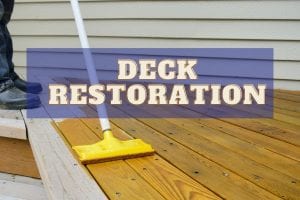A Step By Step Deck Restoration Guide
A deck is an important part of many Australian homes and adds to our way of life.
They add an extra living space and utility area to your house.
It can be a great place to enjoy fresh air and sunshine in the mornings.
A deck is also be a place to hangout with family and friends to enjoy BBQ’s and parties in the afternoon or evening.
Because of its exposure to harsh elements like the Australian sun, your deck needs routine maintenance that addresses any damage.
This upkeep will protect your outdoor areas and prevent more significant deck problems in the future.
It will also keep the deck in great condition for many years.
Deck restoration is one of the best ways that you can use to improve the appearance of your old deck.
Here is a step by step guide to restoring your outdoor space.
-
Inspect The Deck’s Surface
The impact of harsh weather conditions, including UV rays, high heat, and rain, can damage your deck structure.
Before starting your deck restoration project, it’s essential to start by thoroughly inspecting your deck surface.
In this step, you’ll look for any loose deck boards. You can also check if there are structural component issues such as rotting or split boards. It is a good idea to also check railings or the pergola to see if these need to be repaired at the same time
Use a leaf blower or a broom to remove any debris on the surface.
You can as well use a scraper to remove any dirt and debris trapped in between the deck boards.
The correct method of cleaning your deck depends on its finish and your end goals for restoring it.
If you’re restoring a deck that has been formerly coated with paint:
You may need to use a paint remover to strip off the paint. Then, clean and sand the surface before applying a new stain or finish
However, if you’re only painting, the process will involve cleaning, sanding, and then repainting.
Wear protective clothing such as gloves at all times to keep yourself safe from splashes and fumes
If your outdoor space is not painted but has a stain, you don’t need to apply a paint remover.
Just use a deck cleaner to clean the wood surface.
Oxygen-based wood cleaners are known to be the best and most effective cleaners for eliminating mildew stains.
These cleaners will also remove any graying caused by ultra-violet exposure.
Additionally, they will clean the wood surface, eliminating all dirt and deposits.
-
Deep Clean The Deck Using A High Pressure Cleaner.
Deep cleaning is a significant step in deck restoration.
A power washer can be a highly useful tool for deep cleaning a deck.
However, it can easily damage your surrounding outdoor entertainment area if it’s carried out incorrectly. Using excessive water-jet pressure or an incorrect sprayer technique can etch away the surface of the wood. It may also wreck some of your deck boards and surrounding paint work
When deep-cleaning your wood deck using a power washer, ensure that you use the minimum pressure that offers effective cleaning.
For softwoods like pine or cider, the recommended pressure is approximately 500 to 600 pounds/ square inch (psi). If your deck is made up of harder woods, you can use higher pressure which shouldn’t exceed 1200 to 1500 psi.

-
Sand Your Deck
After you power-wash the deck boards, the wood fibres increase as they swell with water.
Once the wood fibres are dry, they may have extra splinters. For an effective sanding, you have to sand the entire area before staining.
Sanding your deck will be easiest if you use an orbital sander. However, the right sandpaper is vital to have excellent results. Sandpapers that are too fine leave the deck wood pores full of fine dust that prevents soaking of the stain.
Using a sandpaper that is too rough can damage the wood, particularly the softer woods like cider.
For the main deck boards, the ideal sandpaper grit should be 60 or 80.
You can use a sandpaper grit of 80 or 100 for the handrails.
After the sanding, make sure you sweep and vacuum all wood surfaces thoroughly. Avoid rewashing the deck as doing so might cause swelling to the wood grain and coarsen the sanded surfaces.
This step is very vital in the preparation so take adequate time in it to ensure your deck is entirely clean and has no damage or anything to stop the stain or paint from adhering to the wood.
Since sanding is a dusty process, safety equipment like wear some eye protection and a mask are a good idea
Choosing the stain is one of the most significant steps in your deck restoration project.
There are various types of staining products.
One is the semi-transparent stains that permit the deck wood grain to be noticeable through the stain.
There are also opaque stains that dye the deck wood and conceal all the wood grain.
Additionally, you can find oil-based as well as water-based stains.
The water-based stains are known to offer easy cleanups.
However, nearly all experts will agree that most water-based outdoor stains have a shorter lifespan than oil-based products.
A quality oil-based stain is the most recommended stain for your outdoor area.
It’s an outdoor semi-transparent stain that soaks thoroughly into the wood grain.
Once applied, the final color of the stain may differ from the color brochure.
This can be due to the type of timber you have stained and many companies do have comparison charts to show the color examples on different timbers.
-
The Stain Application
Applying the stain is the last step in your deck restoration project.
Ensure you use the right brush or roller to soak the stain into your deck’s timber surface.
The right brush or roller will also help to control the consistency and even application of your staining process.
Remember your deck must be completely dry before you stain it. It is critical to that your deck is left to dry for approximately two days before proceeding with the staining step.
Water present in the wood pores will stop the adequate absorption of the stain into the timber.
Deck restoration may seem like a big task and if it does seem like too big a job – Then there are many professional Brisbane deck builders that also do deck restoration.
If you are confident and have the time, then by simply following the above steps, you’ll make your old deck look like new once again.
The post Deck Restoration Guide appeared first on GQ Central.



